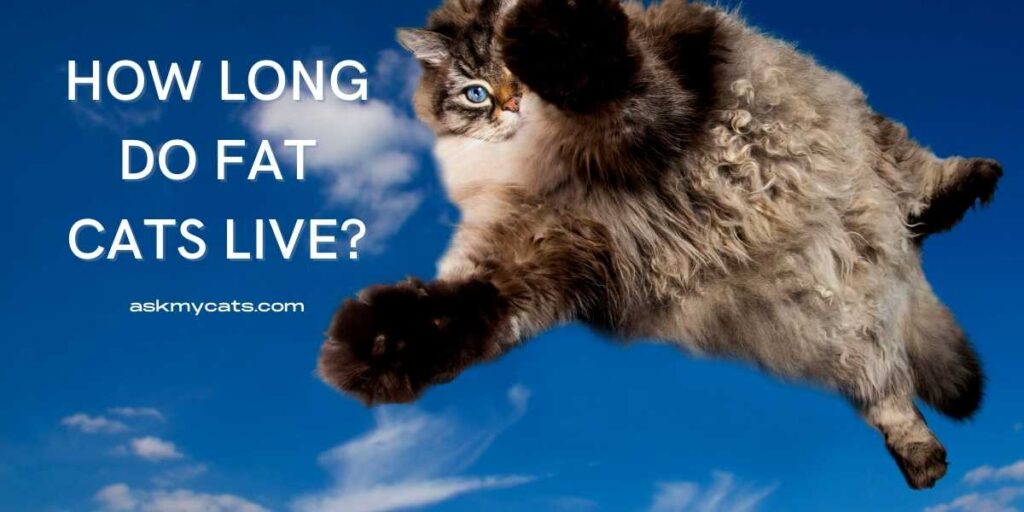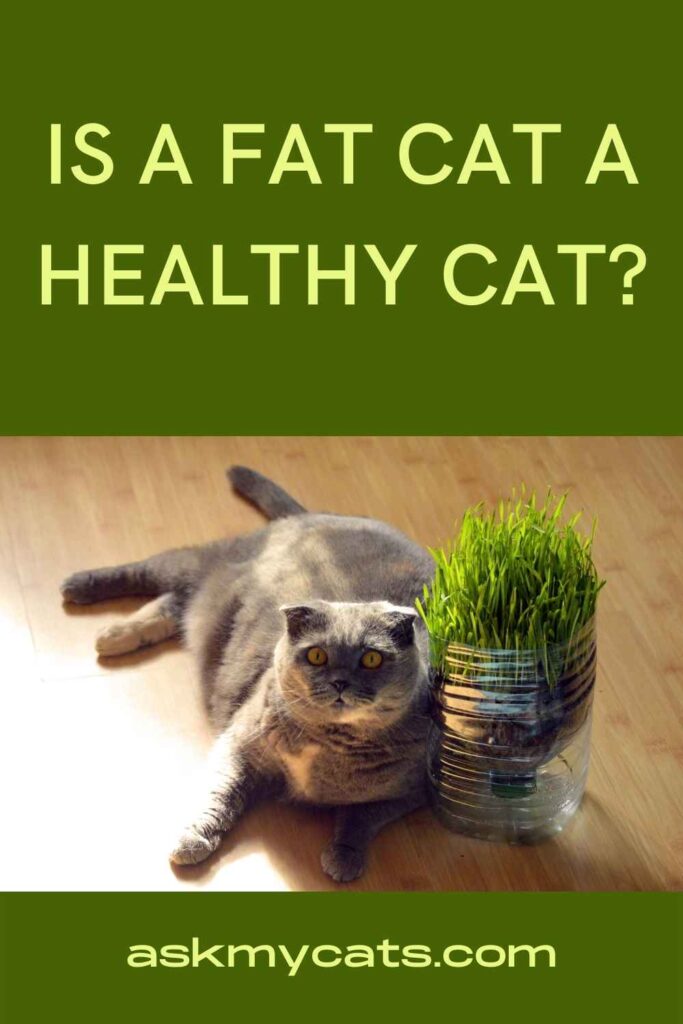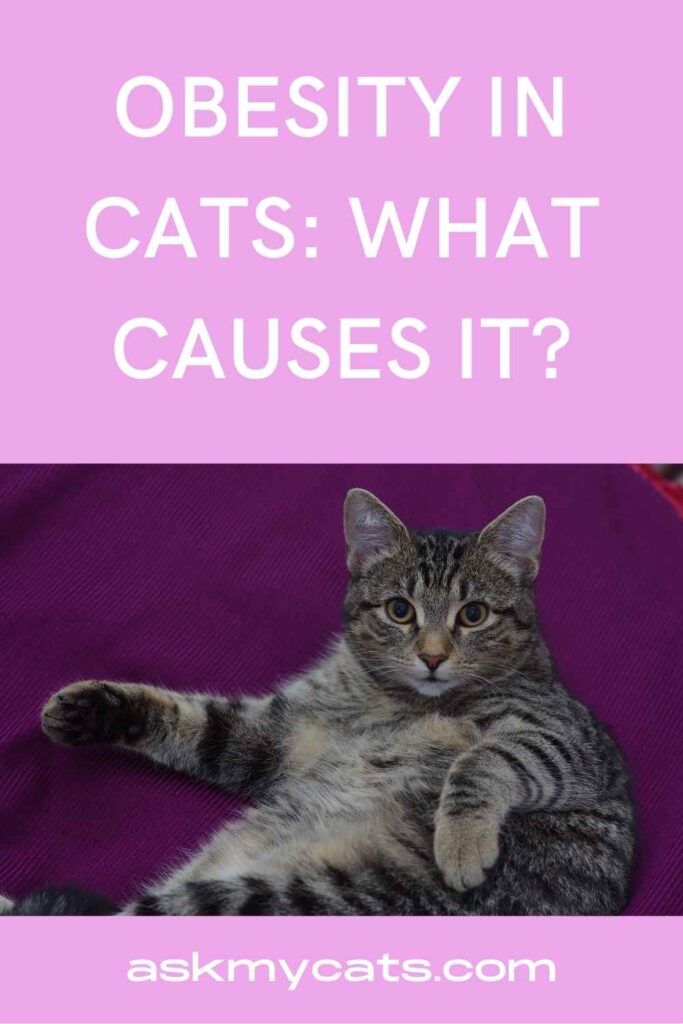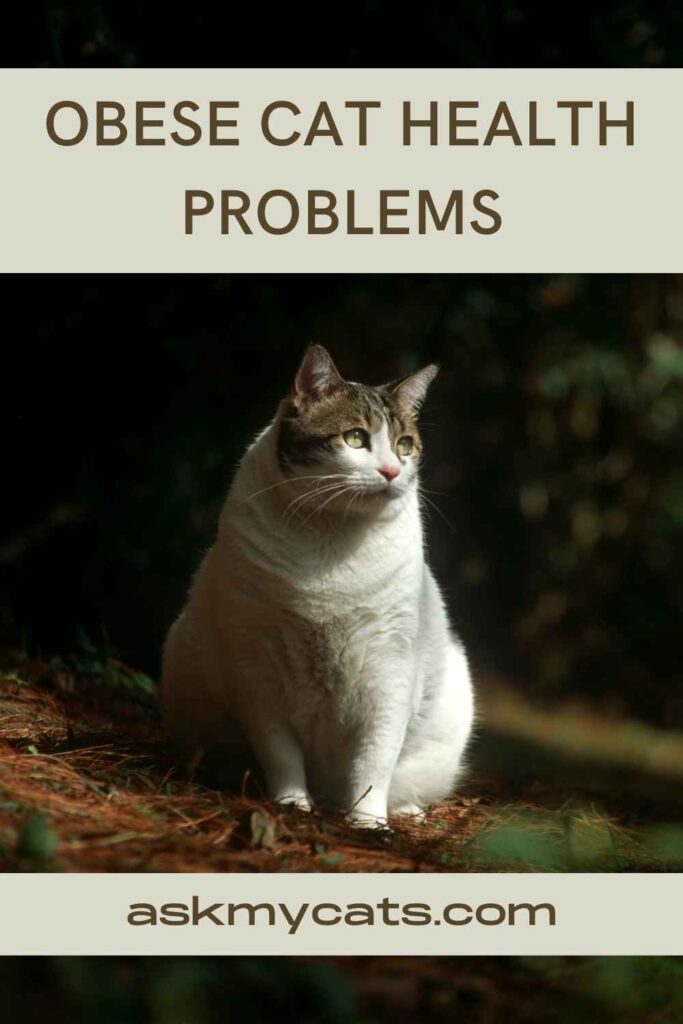Verified & Fact-chaked by Dr. Nele De Schryver(Small Animal Veterinarian)
Chubby. Cute. Cuddly. A chubby cat is a snuggle buddy and in great words of Agnes from Minions, you would also go, “He’s so fluffy I am gonna die”. However, cuteness may come at a price.
Excess weight in cats puts them at risk for a range of illnesses and disorders that can affect their health and well-being, just as it does in humans.
Obesity is defined as a buildup of extra bodily fat. Because excess body weight and fat tend to go hand in hand, most overweight cats will also have excess body fat.


Give Your Cat the Perfect Day
Get the Free Ebook!
Do Fat Cats Live Shorter Live?
According to the Association For Pet Obesity Prevention, 60 percent of cats in the United States are overweight or obese. Even more alarming, research suggests that just 10% of owners of overweight cats are aware that their cat is overweight.
You most likely have a fat cat and aren’t even aware of it.
Obesity shortens a cat’s life and increases its risk of sickness. A cat’s life expectancy is reduced even if it is somewhat overweight. Obese cats (8-12 years old) have a 2.8-fold increased death rate when compared to lean cats.
Previously, fat was thought to be a very inert tissue that only served to store surplus energy calories and increase body bulk. Fat tissue is now known to be metabolically active, according to scientific research.
It secretes inflammatory hormones and puts the body’s tissue under oxidative stress, both of which lead to a variety of disorders. Obesity is being viewed as a chronic, low-level inflammatory illness for the first time.
Is A Fat Cat A Healthy Cat?

Fat cats are charming and cute. The reality is that being overweight is also very bad for your cat. Diabetes, arthritis, high blood pressure, renal disease, cancer, and other diseases are all more common in obese cats.
Your overweight cat’s lifetime will undoubtedly be lower than that of a healthy-weight cat. That isn’t cute in the least.
Here are the top three indicators that your cat is overweight.
1. Clasp your hands around your cat’s neck. A thin layer of flesh between the skin and the bones is typical and healthy for cats. Your cat is overweight if you have to push hard to feel a bone or if you can’t feel any bones at all.
Make a fist with your hand and feel the top of it. Your cat’s rib cage should feel like this. Now open your fist and feel the flesh of your palm by flipping your hand over. Does your cat’s rib cage feel like that? If this is the case, your cat is overweight.
2. Your cat is unable to reach. Is your cat’s fur appearing a little rough? A healthy cat can reach all of its bodily parts and clean them. A large cat’s back and rear are typically difficult to reach, resulting in poor toilet hygiene and prickly and/or matted hair.
3. Think in terms of forms. From the top-down, stand over your cat and gaze at their silhouette. Your cat should have the appearance of an hourglass rather than a bowling ball.
If you notice that your cat is overweight, it’s time to take action. Keeping doing what you’re doing now isn’t going to work.
You might also like to read more about fat tabby cat
How To Determine If Your Cat Is Fat or Not?
If you want to decide if your cat is fat or not, better to determine his BCS (= Body Condition Score).
You touch the ribs towards his back and if you can’t feel them very well he’s more likely to be overweight. Also from the ribs towards his behind, the body should go inwards at the flanks, and not straight ahead.
If it goes straight ahead, we also call this ‘the table’, he is overweight. If he goes outward, beyond straight ahead, he’s obese.
The BCS is categorized in two ways, either in points on 5 or 9 in total.
So the ideal weight would be 2,5 – 3/5 or 4,5 – 5/9.
An obese cat would be 4-5/5 or 6-9/9.
This is not always easy to determine, so if you’re unsure, bet to have it done by a vet or a veterinary assistant.
For more details, you can always check out the video by our expert panel Dr. Nele De Schryver
Does Obesity Shorten A Cat’s Life?
Before drawing conclusions about the shortened lives of our felines let us understand what obesity in cats means,
When a cat’s extra fat is more than 10% above its optimal body weight, it’s deemed overweight, and obese when it’s more than 20% above its ideal body weight. Obesity in cats is highly frequent, affecting up to 63 percent of cats in affluent nations.
Obesity puts your pet at risk for a variety of health issues, including a compromised immune system, endocrine, and metabolic problems, cardiovascular disease, and arthritis.
Obese cats are more likely to be middle-aged (8-12 years old), neutered, and indoor-only or predominantly indoor cats. For weight loss, diet and eating practices are crucial.
Male cats also have a higher risk of urinary obstruction. Which, if not noticed on time or left untreated, will kill them very quickly.
Obese cats are also ticking time bombs! If they get sick and can’t eat anything for a few days, their livers can’t keep up with the fats that pass by to be broken down, causing hepatic lipidosis or fatty liver disease. This in turn causes shock and death quickly follows when not noticed or treated in time.
And taking all of these health factors into consideration, it is a possibility that if your cat is overweight it might have a reduced lifetime than healthier felines.
Symptoms Of Obesity In Cats
Obesity symptoms include, in addition to obvious weight gain:
- Jumping or ascending stairs might be difficult.
- More sitting or lying down, with a reluctance to get up and move around an obvious waistline loss
- Pet parent’s inability to feel rib bones or hip bones
- Your cat’s back seems flat and/or its profile appears rectangular when viewed from above.
- Hair coat that is filthy, unclean, and untidy.
- The collar continues to tighten.
- Having fewer bowel motions and/or passing more gas
Also, check out more details about fat tuxedo cat
Obesity In Cats: What Causes It?

Obesity in cats is caused by two types of variables:
Animal-specific factors and Dietary-specific ones.
Animal-specific factors :
Cats between the ages of 8 and 12 are more likely to be overweight than cats younger or older.
Neutered: Neutering causes cats’ metabolism to slow down while they get more hungry. So if you keep giving the same kind and amount of food as before, your cat is bound to gain weight. Your cat needs a specific diet and amount after neutering. This way it is easily avoided.
Indoor cats, particularly cats with limited outside access, are more likely to be overweight due to increased inactivity and fewer possibilities for calorie-burning exercise.
Also, obesity doesn’t occur in feral cats, so it is a problem caused by humans.
Underlying health conditions: Food allergies might make it difficult to choose the optimum type of food for weight loss. Joint pain and arthritis can restrict movement and, as a result, energy expenditure, putting your cat at risk of gaining weight.
Diet-related variables :
Type of diet: A diet containing predominantly dry food promotes weight growth in cats more than a diet consisting wholly or primarily of canned food.
Inaccurate food measurement: When it comes to food, it’s crucial to be consistent, use a scoop with a known measure (e.g., a 14-cup measuring cup vs. a plastic cup), and feed from a bowl that’s appropriate for the measured food supplied. Overfeeding a cat is more likely if you don’t have these instruments.
Rapid food consumption: If your cat eats too rapidly, he may become bored, cry, or beg, prompting you to serve him additional food off schedule to keep him interested and quiet.
Feeding one or two large meals throughout the day may raise your cat’s chances of obesity and begging when compared to free choice offering or feeding modest, frequent meals.
Excessive rewards: Because treats are heavier in fat and calories than a cat’s usual food, giving too many treats throughout the day rapidly adds up to a nutritionally imbalanced diet.
Another important point raised by our Expert Dr. Nele De Schryver:
People treat their cats like a human and give them table scraps or even fully cooked food. This not only easily leads to obesity but also deficiencies in essential vitamins and amino acids. Furthermore, cats are strict carnivores so they shouldn’t eat anything else than meat.
Obese Cat Health Problems

Obesity can lower your cat’s quality of life and shorten its lifespan; it’s more difficult for it to play and move around, and surgical treatments and check-ups become more difficult.
Diabetes
Fat cats are far more likely to develop diabetes, which needs daily insulin injections in 80 percent to 90 percent of obese cats.
When excess weight is eliminated, the accumulated fat that is directly responsible for a failure to manage glucose is no longer there, and diabetes may often be reversed.
Immune system dysfunction
When your cat is fat, its immune system is weakened, leaving them more susceptible to infection.
This includes urinary infections and stones, which are caused by overweight cats being less active, drinking less water, and urinating less frequently than healthy cats.
Failure of the liver
Liver failure is a major and potentially deadly concern in obese cats. Fat is transported from reserves into the liver to be utilized as energy when the cat’s body senses it is undernourished – for example if a steady food supply is interrupted.
However, a cat’s body is unable to efficiently handle this process, resulting in poor liver function and, in severe cases, catastrophic hepatic insufficiency and liver failure.
Mental health and grooming
Cats with excess weight have a harder time grooming themselves, which can contribute to skin issues. An overweight or obese cat may experience mental health issues as well; rather than fleeing or hiding when they detect danger, overweight cats are unable to respond fast and hence are unable to follow their instincts, which can be distressing.
You can prevent your cat from the dangers of being overweight or obese by following the appropriate diet, exercise, and behavior. To begin, consult your veterinarian for advice on the best course of action.
Cancer
Obesity raises the chances of acquiring a variety of cancers. This is due in part to the inflammatory substances released into the body by fatty tissues.
Joint Concerns
Obesity puts a toll on a cat’s joints because of all the additional weight it needs to carry around.
Cats are supposed to be light, agile creatures. Their bodies have developed in this manner. The joints of a cat aren’t made for carrying more than their ideal weight.
When a physique like this is confronted with the strains of obesity, it struggles. Overweight cats’ joints will develop arthritis sooner than usual. This will become debilitating over time.
Interesting Read: Do Indoor Cats Live Longer?
How To Help My Fat Cat?
Taking your overweight cat to the vet is the initial step in assisting it. A professional will do a comprehensive assessment and recommend the best course of action. In most situations, this will include following a strict diet and exercising daily.
Exercise might be difficult or impossible for a cat that is excessively fat or physically ill. Depending on the environment and the temperament of the cat, aquatic therapy may be an alternative. If there are health concerns, medication may be required.
When cats are accustomed to delicious food and treat all of the time, a sudden change in diet might be upsetting. Don’t give in to their cries of desperation. Maintain your diet. They may not appreciate it, but it will help them.
Also, check out expert tips given in Dr. Nele De Schryver’s video on how to help your cat lose weight
Frequently Asked Questions
Are obese cats in pain?
Inflammation is aided by fat cells. Pain is caused by inflammation. As a result, cats with excess fat cells are more likely to acquire and stay in pain.
Do fat cats have trouble breathing?
Too much fat on a cat’s body has systemic consequences for its health. Obese cats may have problems breathing regularly, which may be audible. Snoring is similar to snoring when sleeping. The sound you’re hearing is the cat’s lungs trying to fill with oxygen and the comfort she feels when she can exhale.
Do fat cats sleep more?
Obesity is a highly likely cause of your cat’s excessive sleeping. Obesity in cats can be caused by a variety of factors, including an uneven diet and a lack of activity. A cat should be given three to four little meals each day on average.
Final Words
A fat cat is 10-20% above its optimal body weight, or even more. These animals are unhealthy and are more prone to major illnesses including diabetes, heart disease, circulation issues, and arthritis.
Cats who are overweight have a shorter lifespan than their slender counterparts. On average, an overweight cat will live 5 years less. Obese cats can live up to ten years less.
Anyone concerned that their cat is overweight should consult with their veterinarian about developing a balanced food and activity plan for feline weight loss.
